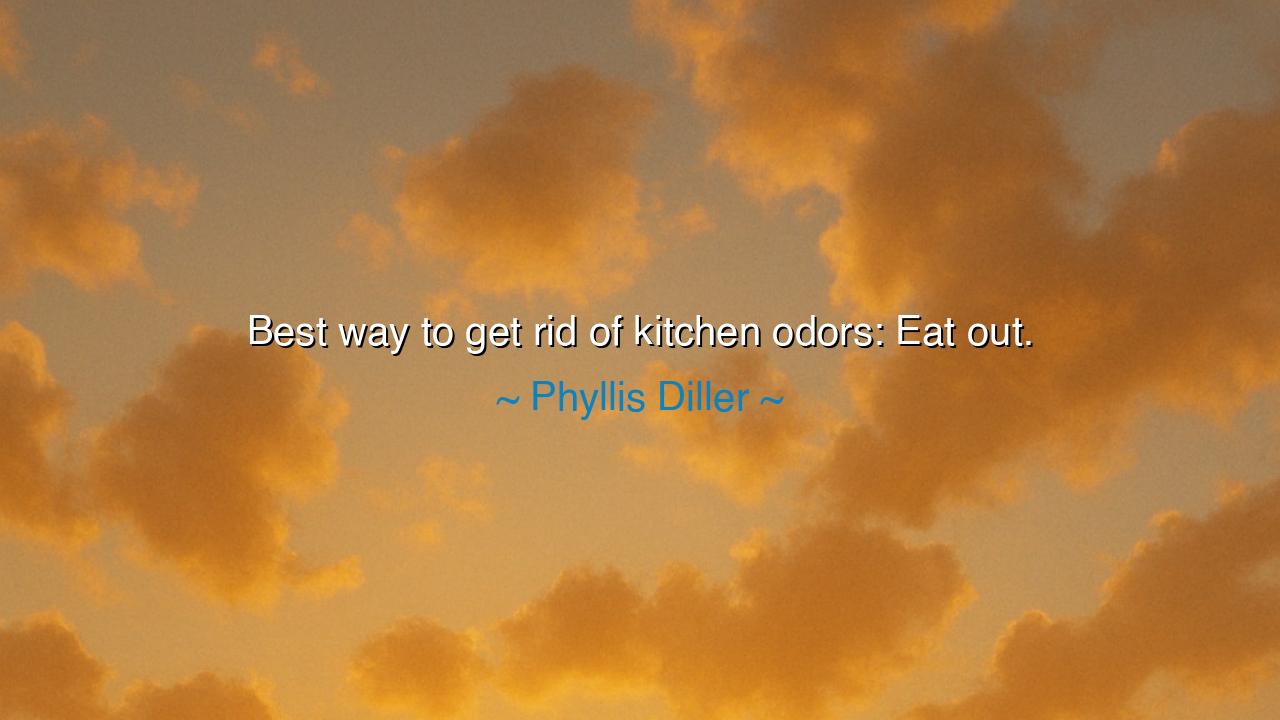
Best way to get rid of kitchen odors: Eat out.






In the grand theater of laughter where truth and absurdity dance as one, the incomparable Phyllis Diller — the first great queen of stand-up comedy — once declared with her sharp and radiant wit: “Best way to get rid of kitchen odors: Eat out.” At first, this quip draws a chuckle — a simple jest about the labors of home life, the endless duties of cooking, cleaning, and caring. Yet beneath the surface of humor lies a profound message, both rebellious and liberating. For Diller, laughter was not just entertainment — it was a weapon of emancipation, a means to reclaim dignity from drudgery, to find joy amidst the tyranny of expectation. Her jest is both a wink and a war cry: a declaration that one’s worth should not be confined to the kitchen, nor one’s happiness bound to the fumes of labor.
The origin of this line, like much of Diller’s comedy, sprang from her own life — a woman who, before becoming a legend, lived the roles society assigned her: wife, mother, homemaker. In the mid-twentieth century, when women were told their glory lay in spotless kitchens and steaming casseroles, Diller broke the silence with laughter. She turned her exhaustion into art, her frustrations into fire. Her line about “eating out” is not just advice about meals; it is a metaphor for freedom — for stepping outside the narrow walls of expectation to taste the wider flavors of life. Beneath its jest lies a quiet act of revolution, as if she whispers to all who toil without gratitude: you are allowed to rest; you are allowed to choose ease over endurance.
This spirit of rebellion echoes across history. Consider Sappho of Lesbos, the ancient poetess who sang not of war or empire, but of love, longing, and the inner life of women. In a world ruled by men and measured by conquest, she dared to find meaning in beauty and personal truth. Like Diller, she too was accused of frivolity, of turning from the “serious” work of life. Yet both women, centuries apart, shared the same sacred defiance: the belief that joy is a form of wisdom. To laugh, to rest, to “eat out,” is not laziness but an act of remembering one’s humanity.
Phyllis Diller’s humor also holds the mirror to the human tendency toward self-imposed burden. We polish, we cook, we strive endlessly to perfect our lives, believing that happiness lies in order and approval. Yet Diller reminds us that sometimes the most enlightened choice is to step away — to close the oven door, set aside the mop, and reclaim the simple pleasures that make life worth living. Her jest carries a whisper of stoic philosophy: that the wise person knows when to act and when to abstain, when to labor and when to laugh. As the Stoics said, “It is not things themselves that trouble us, but the opinions we hold about them.” To Diller, the trouble was not the kitchen — it was the guilt that chained people to it.
And so, her words become more than comedy — they become counsel. The “kitchen odors” she speaks of are not merely the lingering smells of food; they are symbols of life’s small suffocations — the tasks, the routines, the duties that consume without nourishing. To “eat out” is to seek renewal, to breathe, to find delight in new surroundings. It is permission to live expansively, to embrace the world beyond one’s confines. In this, Diller’s laughter carries the same wisdom as the Zen masters, who taught that enlightenment often comes not from solemn meditation, but from the moment one sets down the burden and laughs at the absurdity of carrying it for so long.
We see the truth of her words also in the life of Julia Child, another woman who transformed the domestic realm into art and liberation. Where others saw cooking as duty, Child saw it as joy — a dance of creation rather than obligation. Yet even she would laugh at the notion of perfection. “Never apologize,” she said, “no matter what happens in the kitchen.” Both Child and Diller understood that imperfection is the spice of life, and that humor, not perfection, is what makes living bearable and beautiful.
Thus, O listener, take this jest not as a mere household joke, but as a call to reclaim your spirit. When life fills with the odors of fatigue and obligation, step outside and breathe again. Seek joy beyond the walls of duty. Do not let the world measure your worth by how clean your counters are or how diligently you serve others. Serve your own soul first. Rest when weary, laugh when burdened, and remember that laughter itself is a cleansing fire — it burns away resentment, leaving behind the sweet scent of freedom.
And so, let Phyllis Diller’s wisdom ring like laughter in eternity: “Best way to get rid of kitchen odors: Eat out.” For sometimes the simplest jest contains the grandest truth — that life is too brief to be spent scrubbing away its messes. Better, instead, to savor its flavors. Go forth, then, and feast not just upon food, but upon life itself — with laughter as your wine, and freedom as your meal.






AAdministratorAdministrator
Welcome, honored guests. Please leave a comment, we will respond soon